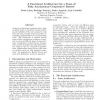Free Online Productivity Tools
i2Speak
i2Symbol
i2OCR
iTex2Img
iWeb2Print
iWeb2Shot
i2Type
iPdf2Split
iPdf2Merge
i2Bopomofo
i2Arabic
i2Style
i2Image
i2PDF
iLatex2Rtf
Sci2ools
ROBOCUP
1999
Springer
1999
Springer
A Functional Architecture for a Team of Fully Autonomous Cooperative Robots
A three-level functional architecture for a team of mobile robots is described in detail, including the de nition of the role assigned to each level, the main concepts involved, and the corresponding implementation for each individual robot. The architecture is oriented towards teams of fully autonomous cooperative robots, able to carry out di erent types of cooperative tasks. Complexity is reduced by the decomposition of team strategies into individual behaviors, which in turn are composed of primitive tasks. Relationships among robots of the team are modeled upon the joint intentions framework. An application to Robotic Soccer and some of its preliminary results are presented.
Autonomous Cooperative Robots | ROBOCUP 1999 | Robotics | Team | Three-level Functional Architecture |
Related Content
| Added | 04 Aug 2010 |
| Updated | 04 Aug 2010 |
| Type | Conference |
| Year | 1999 |
| Where | ROBOCUP |
| Authors | Pedro U. Lima, Rodrigo M. M. Ventura, Pedro Aparício, Luís M. M. Custódio |
Comments (0)

